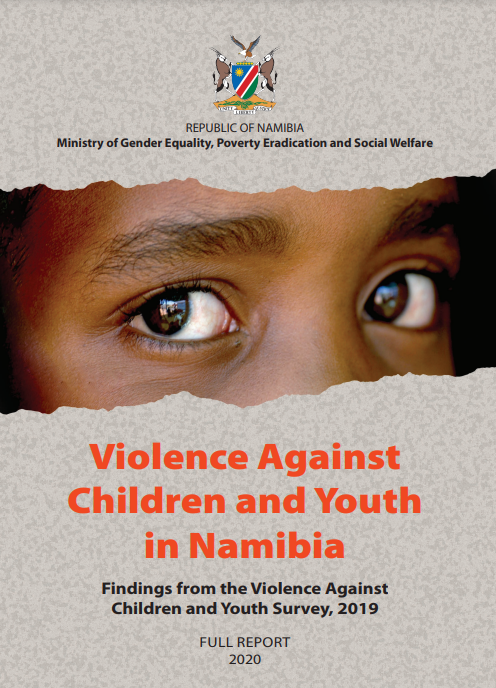The International Training and Education Center for Health (I-TECH), under the leadership of Government of Namibia ministries overseeing child welfare and health and in close collaboration with the Namibia Statistics Agency (NSA), UNICEF, and the U.S. Centers for Disease Control and Prevention (CDC), supported the implementation of Namibia’s first Violence Against Children and Youth Survey (VACS).

VACS are national surveys that measure the prevalence and impact of violence on children and youth around the world. The survey results help inform future program decisions and policy approaches to ensure the safety of children and youth. On 28 September 2021, the Day of the Namibian Child, the Government of Namibia published the final Namibia VACS report.
The survey, funded by the U.S. President’s Emergency Plan for AIDS Relief and led by the Ministry of Gender Equality, Poverty Eradication and Social Welfare (MGEPESW), interviewed households with children aged 13-24 years in all 14 regions of Namibia from March 2019 through June 2019.
Survey operations—including data collection by field teams, data generation, and analysis—were carried out by the NSA, the central statistical authority responsible for all official statistics in Namibia. “It has been a pleasure working together with the Ministry of Gender Equality, the University of Washington, I-TECH, and CDC on this important survey,” says Ottilie Mwazi, Namibia’s Deputy Statistician General. “Our team has learned a lot from the process and is very proud to have contributed important data that will help to improve child welfare in Namibia.”
Prior to data collection, I-TECH alongside CDC colleagues hosted a two-week training for 130 enumerators, focused on best practices for data collection, interview techniques, and key aspects of the survey protocols. In addition to supporting VACS training, I-TECH and the Ministry of Health and Social Services (MoHSS) ensured all selected enumerators were trained and certified by the Namibia Institute of Pathology to conduct HIV rapid testing so any survey respondent aged 14-24 years who did not know their HIV status and wanted a test during their interview could immediately be tested.
In total, 5,191 individual interviews among 6,042 households (86.35% overall response rate) and 3,232 HIV rapid tests were conducted as part of data collection. Any respondent testing positive for HIV during the survey was linked to psychosocial and HIV/AIDS care and support in line with well-established MoHSS guidelines and the survey protocol.
Expanding Post-Violence Clinical Care
The survey results have informed important initiatives across Namibia’s wider social welfare and health systems. MGEPESW has moved forward with drafting the National Action Plan on Violence against Children and has accelerated the training of various child welfare stakeholders such as police officers and social workers, while operationalizing the establishment of more child shelters in several regions.
“The data coming out of Namibia’s VACS have really brought home how prevalent and serious violence against children and adolescents really is,” says Helena Andjamba, Director for Child Welfare at MGEPESW. “Having these hard facts readily available has helped greatly during our policy and planning engagement with multiple stakeholders during the past year. We are now moving forward with the Ministry of Justice in drafting a new Child Justice Bill, and at the same time we are engaged with the Ministry of Education on strengthening the National School Safety Framework.”
Following the completion of the survey, the MoHSS convened a technical working group with I-TECH, the World Health Organization, UNFPA, Project Hope, and other stakeholders to coordinate and strengthen first-line post-violence clinical care in primary health care facilities across Namibia. I-TECH also supported the compilation of clinical guidance on emergency care for survivors of sexual violence and its inclusion in the 2021 edition of the Namibia Standard Treatment Guidelines published by the MoHSS.
Much of the focus during the second half of 2021 was on integrating post-gender-based violence (GBV) clinical care in MoHSS HIV/AIDS clinics and antiretroviral therapy (ART) services throughout Namibia. As part of this work, I-TECH conducted a mentorship training-of-trainers for 28 HIV clinical providers, nurses, and testing services staff. These mentors now provide ongoing technical guidance and supportive supervision to frontline health workers through monthly facility visits.
To further improve post-violence care in clinics, I-TECH compiled a GBV care implementation guide for Namibian healthcare providers. This includes elaboration of best practices, as well as a suite of materials including posters, pamphlets, job aids, and a pocket booklet for communities, clients, health workers, and health facility managers, respectively. An intimate partner violence/GBV screening tool to be administered to ART patients with persistent high viral loads is also currently being piloted in ten health facilities.